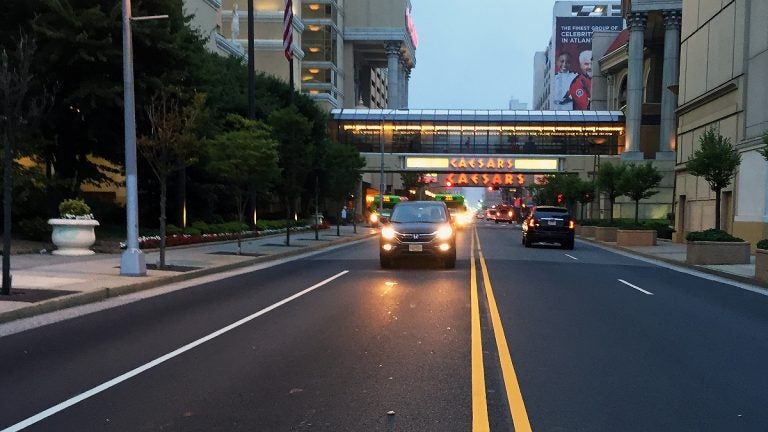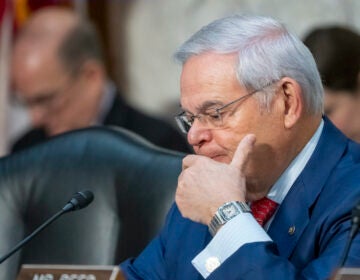Atlantic City rescue plan heads to Christie’s desk

Pacific Ave in Atlantic City. (Alan Tu/WHYY, file)
More than a year after they were introduced, the state Senate in New Jersey yesterday approved a major package of time-sensitive bills designed to stabilize Atlantic City’s economy.
Assuming Gov. Chris Christie signs the bills, three major changes will take effect immediately: the city’s eight remaining casinos will make pre-determined payments in lieu of property taxes (PILOTs) in exchange for a promise to refrain from challenging their tax burden in court; the state will redirect funds from its powerful Casino Reinvestment Development Authority (CRDA) to pay down the city’s hulking bond debt; and the Atlantic City Alliance (ACA) tourism marketing agency will shut down two years ahead of schedule so that casinos can contribute the funding that supported the ACA to the city’s operating budget instead.
After keeping stakeholders anxiously waiting for months, Christie conditionally vetoed the original versions in the fall and the state Assembly voted to concur with his suggestions last month. Yesterday’s state Senate action to concur with the changes is the last step before the bills return to Christie’s desk for approval.
The two chambers passed the funding bills easily, as Christie had recommended only relatively minor changes. Over the objections of Atlantic County stakeholders, he didn’t change the funding formula that will be used to calculate each casino’s annual portion of the $120 million in PILOT payments they will collectively owe to the city for the next 15 years.
He did, however, block the creation of a locally managed council to process the payments; rather, he asked the Legislature to direct the quarterly payments to the state’s Local Finance Board, which will disburse the money only after its members are satisfied that the city is implementing an as-yet-approved financial master plan. A Christie-appointed financial manager is working on that plan, which some fear could result in a declaration of bankruptcy but seems more likely to end in a severe restructuring of debt.
Supporters say the measure is needed to keep casinos from appealing their tax liabilities in an era of drastically shrunken revenues. In addition to minimizing the damage smaller property tax payments and court-mandated refunds are wreaking on the city — threatening to force higher residential and commercial property taxes to compensate — the bill guarantees a steady and predictable stream of income that will help city leaders budget properly.
The CRDA bill takes the Investment Alternative Tax of 1.25 percent of gross casino revenues that helped support the CRDA’s economic development mission and reallocates it toward financing city-owned debt.
The Borgata took the city to court earlier this month after Atlantic City failed to pay the casino an agreed-upon $62.5 million toward what the city owes Borgata in tax overpayments. Mayor Don Guardian said the city could go bankrupt if forced to make the payment promptly, which totals slightly more than one-third of the total debt the city owes to Borgata.
Moody’s Investment Service, one of the credit rating agencies that downgraded the city’s bond status last year, warned that regardless of what happens with the bills, the city will still need to fill a $34 million budget hole in 2017.
In a recent report, Moody’s said that if Christie signs the three bills, the city will benefit but it won’t be enough to “cure the city’s long-term structural deficit.”
However, a worse scenario would be the bills’ failure. “The city’s liquidity will remain dangerously narrow” and would likely remain “insolvent without some other form of support,” the report said.
In his conditional veto, Christie barely touched the bill. He only tied its success to the passage of the main PILOT bill instead of enacting it immediately upon becoming law.
If the CRDA loses $30 million per year, it’s unclear how it will continue to fulfill its mission. Over the past decade, its responsibilities have both expanded and shrunk. Whereas it previously provided financial support to large-scale investment projects around the state, it now limits its work primarily to the state-designated Tourism District that encompasses a wide area around Atlantic City’s casinos. When the state formed the 1,700-acre Tourism District in 2012, the CRDA was charged with writing its master development plan, providing security and management, and overseeing and funding zoning, redevelopment, and convention services within the district.
The CRDA declined to comment on the state Senate vote.
Further, the authority may take on another duty now that the Legislature has dissolved the ACA two years before the law that created it was supposed to expire.
With no leisure tourism destination marketing agency left in the city, the CRDA may absorb tourism marketing tasks, as it did when it took over the now-defunct Atlantic City Convention and Visitors Bureau.
Or, in a more likely scenario, the CRDA-controlled Meet AC convention marketing agency may add leisure tourism marketing to its mission. But with the ACA’s $30 million annual operating income (contributed exclusively by a consortium of the city’s casinos) diverted to the state for general city expenditures and the CRDA losing much of its own budget, Meet AC may not get any additional money to support its expanded role.
Jeff Guaracino, soon-to-be-former executive director of the ACA, refused comment last night.
_______________________________________________
NJ Spotlight, an independent online news service on issues critical to New Jersey, makes its in-depth reporting available to NewsWorks.
WHYY is your source for fact-based, in-depth journalism and information. As a nonprofit organization, we rely on financial support from readers like you. Please give today.




